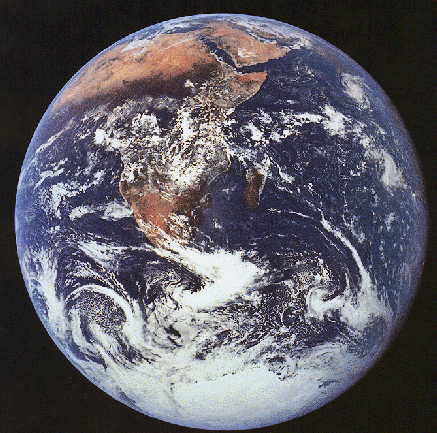What's Wrong with our Oceans? - the Acid Answer
by 'Sailors for the Sea' on 31 Oct 2008

Earth from the Apollo spacecraft SW
Perhaps our planet should have been named 'Ocean' rather than 'Earth' given that the majority of Earth is comprised of water not land: seventy-one percent to be precise. Humans are also comprised mostly of water, a strikingly analogous seventy percent.
In both cases, a proper pH is required not only for vibrant health, but for long-term survival. However, recently the pH of our oceans has been changing, becoming more acidic. Seawater is naturally alkaline, with a healthy pH ranging from 7.8 to 8.5 (7 is neutral).
Since the industrial revolution, and the accompanying atmospheric pollution, the pH has dropped nearly thirty percent, the largest change in our water’s pH in the past two billion years. Science strongly suggests this drop is a direct result of humans producing excessive amounts of carbon dioxide via, car emissions; burning of coal, natural gas, and oil; deforestation; increases in livestock; and even some of our new energy alternatives such as ethanol, to name a few.
These emissions saturate our air, exacerbating global warming. When water and air come into contact there is an exchange of gases. For decades now, our oceans have absorbed nearly one-third of this excess carbon dioxide, conceivably staving off a far greater “land” crisis than we are currently facing. With a daily intake of twenty-two million metric tons of carbon dioxide, and a yearly projection of two billion tons, our waters can no longer keep up with the demands we are making.
The oceans function as our planet's life support system. They moderate our climate and, as noted, filter pollution. They supply us with a rich diversity of food, minerals, and medicines. We also turn to them as a source of comfort, relaxation, recreation, and inspiration. However, due to a steady unchecked decline, our oceans are in trouble, which in turn poses a threat to marine life, coastal and pelagic ecosystems, our economy, coastal cultures and societies.
Our oceans are teeming with organisms that depend on protective shells or external skeletons to survive. Plankton, mollusks, and crustaceans are a few well-known examples. But when the oceans absorb carbon dioxide, carbonic acid is formed. This is the same acid that gives soft drinks their fizz, a fizz that, in this case, dissolves the shells, leaving these organisms vulnerable. Because so many of these organisms serve as the basis of the marine food web, which in turn supports life on land, this breakdown has sweeping effects. In other words, when phytoplankton are in jeopardy, all life—on land or at sea—shares their fate.
While it is normal for plankton to periodically dump their shells in order to regulate the acidity of the oceans (which in turn helps to regulate the planet’s temperature), human-generated ocean acidification has disrupted this natural cycle. As a result, coral reefs—teeming with so much life they’re akin to underwater rainforests—are bleaching. If the coral reefs are allowed to die, as many as a million different species could die with them; and many coastal communities would lose the natural buffer protection the reefs offer against storm surges and hurricanes.
Naturally, this decline in coral reefs and phytoplankton has had a profound effect on all marine life. Fish stocks are already in collapse. For instance, the waters surrounding the Aleutian Islands, once an oceanic Shangri-La resplendent with sunbathing sea lions, lunching sea otters, killer whales and underwater forests of kelp, are now all but barren; most likely the result of plankton dying off.
Not only are we directly interfering with the food chain, but are also causing profound economic implications. Americans, for instance, spend nearly sixty billion dollars each year on fish and shellfish; and coastal and marine commercial fishing generates as much as thirty billion dollars a year while providing close to seventy thousand jobs.
The two most important factors for an organism to survive in the ocean are temperature and acidity, and through ocean acidification we’re altering both. There are many schools of thought on the severity of this damage. Some camps believe even if we stop everything now, it will take 10,000 years for our oceans to bounce back.
The true extent of the harm will be determined during the upcoming years as further investigation occurs and our understanding grows. In the meantime, we know many of the contributors to global warming are also responsible for ocean acidification. Change is happening quickly and the actions each of us takes to address ocean acidification will impact the planet during our lifetime and beyond.
So what can YOU do?
**Consider driving a vehicle that produces less greenhouse gas emissions and gets better mileage.
**Research and purchase less harmful power from your energy company, such as solar or wind.
**Avoid coal power.
**Solar panels will get you off the grid and keep your home lit when others experience a power outage.
**Check in your country or state if rebates or discounts for the purchase of solar power exist where you live.
**Work from home, if possible.
**Carpool to work or ride public transportation if available.
**Pedal to the marina.
**Sail.
Links:
Sailors for the Sea (SFS) Home Page: http://www.sailorsforthesea.org/
Sailors for the Sea (SFS) Membership: http://www.sailorsforthesea.org/membership/index.html
National Oceanic and Atmospheric Administration (NOAA): http://www.pmel.noaa.gov/co2/OA/
The Ocean Acidification Network: http://iodeweb3.vliz.be/oanet/index.html
A Sea Change Trailer: http://blip.tv/file/323677/
If you want to link to this article then please use this URL: www.sail-world.com/50355